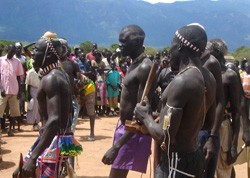
In the 18 months after the signing of the Comprehensive Peace Agreement that ended Sudan’s two-decade civil war, few Sudanese had learned about it. Many knew that it could change their lives, but most were unaware of the details. They heard conflicting reports about what they would gain, or lose, from its agreements on security, wealth sharing, and power sharing.
That began to change in April and May 2006, when USAID launched an initiative to help more than 150,000 people in five Southern Sudanese states access information on the agreement — and help them participate more fully in implementing the peace. The initiative was rolled out in Upper Nile, Jonglei, Warub, and Eastern and Central Equatoria. Official documents in Arabic and English were distributed to all government officials in the south, and an official summary was developed and published in English and Arabic. The Sudan Radio Service created audio versions of the summary in seven languages — Moro, Arabic, simple Arabic, Toposa, Shilluk, Dinka, and Nuer — and the Sudan Mirror published 22,000 summaries to be included as supplements in its Easter edition.
The initiative kicked off with more than 40 rallies throughout Southern Sudan. Each rally attracted around 250 people, while smaller gatherings were held in villages. These gatherings targeted women, church groups, and community leaders, as well as youth, both inside villages and out in the cattle camps.
Audiences were hungry for information, asking scores of questions: Who will enjoy the wealth from the oil revenues, and are Southerners guaranteed to get their share? Who is responsible for tax collection? Who receives the revenue from road licenses?
The initiative encountered many challenges — insecurity, disease outbreaks, rains — but it was a well-received step toward helping Southern Sudanese learn more about their newly found peace.







Comment
Make a general inquiry or suggest an improvement.